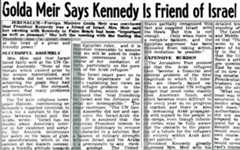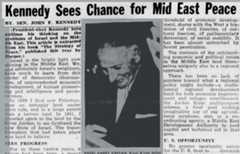John F. Kennedy and Israel: A Look Back
Recalling the 35th president's impact on American-Israeli relations.

U.S. President John F. Kennedy and Israeli Prime Minister David Ben-Gurion, meeting at the Waldorf-Astoria Hotel in New York, May, 1961
From Harry Truman’s diplomatic recognition of Israel within minutes of the country’s declaring independence to Donald Trump’s brokering of a deal to end the October 7 war, American presidents have played crucial roles in the Jewish state’s brief history.
John F. Kennedy is not often mentioned in discussions of consequential U.S. presidents in the two countries’ bilateral relationship, but he made a strong imprint on what became, and remains, a deep and multifaceted alliance. And he did so during a brief White House tenure, less than three years before he was assassinated, on November 22, 1963.
Kennedy “liked Israel. He was very sympathetic to Israel,” said Eytan Gilboa, a professor at Reichman University who is teaching a course this semester on American presidents’ policies regarding Israel.
Several streets in Israel are named for U.S. presidents, including Washington, Lincoln, Truman and Kennedy. But only Kennedy was honored with a memorial, opened in 1966 in a forest near Jerusalem.

Kennedy made his mark on Israeli-U.S. ties in two primary ways: as the first president to sell arms to Israel and the first to describe American-Israeli ties as a “special relationship.”

He visited Israel twice: in 1939, as a Harvard University student; and in 1951, as a third-term congressman in the U.S. House of Representatives. (Not until Richard Nixon in 1974, 26 years after Israel’s founding, did a sitting American president visit Israel.)

As president, Kennedy twice met with Israeli leaders: with Prime Minister David Ben-Gurion at New York’s Waldorf-Astoria Hotel on May 30, 1961, four months after being inaugurated; and with Foreign Minister Golda Meir in Palm Beach, Fla., on December 27, 1962.

During the meeting with Meir, Kennedy said, “It is quite clear that in case of an Arab invasion, the United States would come to the support of Israel.”

It was one of Kennedy’s many statements as president affirming his administration’s commitment to Israel’s security. But in his 2005 bookJohn F. Kennedy and Israel, an American professor of history, Herbert Druks, stated that Israeli officials, including Shimon Peres, the deputy defense minister, believed that the United States would not defend Israel militarily if needed. Israel thus sought from the president a stronger public declaration and even a formal defense alliance, both of which Kennedy declined out of concern that his country’s relations with Arab states would suffer.
It was in the Meir meeting that Kennedy spoke of the United States’ “special relationship with Israel,” one he said is “really comparable only to that which it has with Britain over a wide range of world affairs.”
As if to link the biblical and the strategic, Kennedy added: “We are interested that Israel should keep up its sensitive, tremendous, historic task.”
Kennedy’s trips to Israel – especially the first one, in the pre-state era – seemed to strike a human chord. The 22-year-old was impressed by the sheer determination of the local Jews.
In a 1960 campaign speech, he called Israel a “triumphant reality” of Herzl’s vision and recalled his 1939 visit, when he witnessed Jews developing the country “under conditions of the utmost difficulty by labor and sacrifice.”
“You can feel a sense of dedication … and a willingness to endure hardship,” he said.

Some historians believe that Kennedy felt an emotional pull to Israel, others that he was a canny politician mindful of securing the Jewish vote ahead of the 1962 congressional elections and his expected re-election campaign in 1964.
Calculated or not, his decision in August 1962 to sell HAWK short-range anti-aircraft missiles to Israel was well-timed, coming three months ahead of the November midterms.
Kennedy did so over the objections of the U.S. State Department, which traditionally was (and some believe remains) a bastion of pro-Arab policymaking, and some members of his own National Security Council. This, despite the HAWK system’s being a defensive weapon. Indeed, Kennedy initially opposed the sale, which Ben-Gurion had proposed, telling the prime minister in their meeting that although the HAWK was defensive, and while the Americans wanted “close and harmonious” relations with the Israelis, it still was a missile. Kennedy was wary both of instigating a Middle East arms race and sending Egypt more tightly into the embrace of the Soviet Union.

He gradually came around, in no small part due to the urging of a key aide, a Jewish man, who’d undergone a similar about-face on the HAWK sale: Myer Feldman, who was Kennedy’s deputy special counsel, advised the president on domestic policy matters and was his liaison to the American Jewish community.
Weeks after Kennedy’s decision, Feldman met American-Jewish communal officials and lauded the sale — it included a $23 million loan to be repaid over 10 years — as “the most important policy move initiated by an American administration since 1948.”
The sale also involved a carefully proposed American effort to extract an Israeli commitment to repatriate some Palestinians displaced during the 1948 war. Ben-Gurion rebuffed the initiative, and the administration later withdrew it.
Separately, Kennedy, concerned about the danger of nuclear proliferation and aware of the Dimona facility then under construction, pressed Israel for assurances that it wasn’t developing nuclear weapons. Israel maintained that it would be producing energy for peaceful purposes, but it acceded to Kennedy’s request that American scientists be admitted for annual visits to the site.
The issue had occupied the previous president, Dwight Eisenhower, too. As a senator, Kennedy lobbied the administration to lift its arms embargo on Israel and opposed Eisenhower’s support for United Nations sanctions against Israel following the 1956 Sinai war.

Lyndon Johnson, who succeeded Kennedy as president, would become the first U.S. leader to sell offensive weapons — the Phantom fighter jet — to Israel in 1968. The American package of economic and military aid to Israel would, a generation later, reach more than $3 billion annually. According to the Council on Foreign Relations, a New York-based think tank, $500 million per year in American aid now goes to develop Israeli and joint U.S.-Israeli missile defense programs. In 1981, President Ronald Reagan oversaw the signing of a strategic-cooperation agreement between the countries, just short of a formal defense alliance.
All of it, and more, grew out of Kennedy’s HAWK sale, a move that was “very meaningful,” Gilboa said, “because of the special relations that followed.”
Writer-editor Hillel Kuttler can be reached at[email protected].





